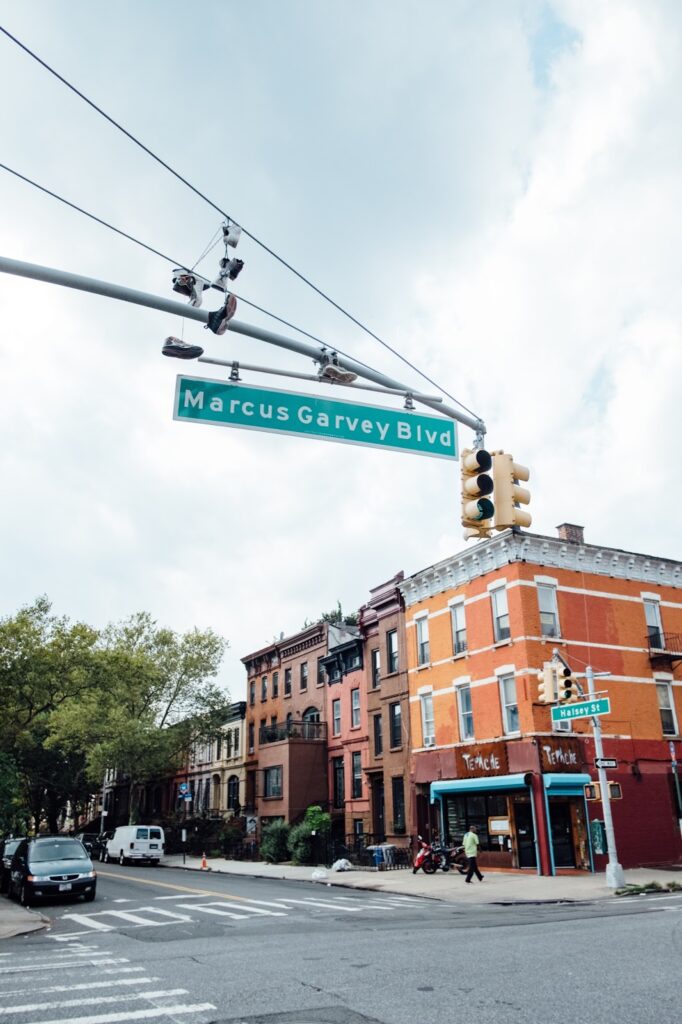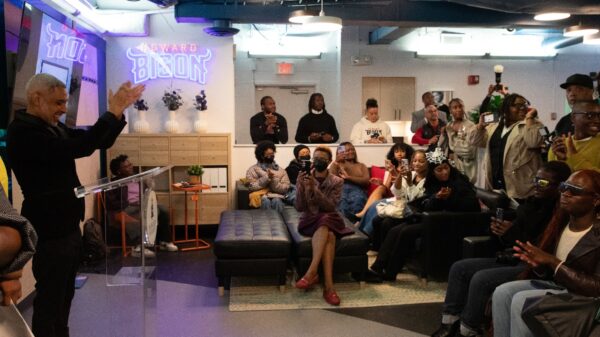
“Every time you see another nation on the African continent become independent, you see that Marcus Garvey is alive.” – Malcolm X
“Marcus Garvey was the first man, on a mass scale, and level, to give millions of Negroes a sense of dignity and destiny, and make the Negro feel that he [or she] was somebody.” – Rev. Dr. Martin Luther King Jr.
After recently celebrating his 90th birthday, Dr. Julius Garvey, son of Marcus Garvey and leader of the Marcus Garvey Institute for Human Development, spoke with The Hilltop about the significance of his family’s work in support of the African diaspora and modern social and economic conditions, and how his father may consider Pan Africanism in the future.
“My father was foundational in defining our philosophy as African people, grounding us in our history and civilization, and moving us towards the expression of our understanding of life,” Dr. Julius Garvey told The Hilltop.
Internationally renowned as one of the luminary Pan-Africanists of the 20th century, Garvey was born in St. Ann’s Bay, Jamaica on Aug. 17, 1887. His work as a father, husband, printer, journalist, businessman, and international organizer led to prominent endeavors such as the Universal Negro Improvement Association (UNIA) and Black Star Line.
While many know Garvey to be one of the foremost Pan-African thinkers and great orators who attracted the attention of the Federal Bureau of Investigation, since 1919, his youngest son, Dr. Garvey remembers unique aspects of his father.
“The last time I saw him, I was five years old. I have memories from England, where we lived at that time,” Dr. Julius Garvey said. [I recall] playing in the backyard, snowballs, going to the movies, getting ice cream, being in the living room playing with my brother, and my dad watching and so on. Those are sort of childhood memories,” he said.
Reflecting on his father’s interests and hobbies, Dr. Julius Garvey mentioned that his mother, Amy Jacques Garvey, mostly told him stories of his father.
“He loved music. I think they had a musical group called The International Jazz House and even had a song that was high on the list in those days. I think it was called ‘Keep Cool,’” Dr. Julius Garvey said.
Garvey was into jazz as a musical form and a wide range of cultural entertainment for African people. He also loved boxing and played cricket as a youth.
“My mother always said that he loved to mix juices, and if he wasn’t immersed in his current affairs, he would probably be a chemist to mix different chemicals,” Dr. Julius Garvey said.
Over the decades, Amy Jacques Garvey’s contributions have become invaluable and numerous as she has carried the Garvey legacy throughout the 20th century after Garvey’s passing.
“My mother was very well educated in Jamaica and had a background in legal work, so she was like his right hand and eventually private secretary who helped to structure the organization and manage books. She also contributed to the women’s papers of the Negro World from 1919-1933,” Dr. Julius Garvey said.
Jacques was instrumental in the 1923 and 1925 publications and compilation of “The Philosophy and Opinions of Marcus Garvey Or, Africa for the Africans.”
“She collected what she saw as some of his best speeches and writings,” Dr. Julius Garvey said.
Considering Garvey’s many publications, speeches, reputation of being provocative, and the common misconceptions of Pan-Africanism, to advance Black liberation in modern society, Black youth and adults alike must familiarize themselves with his works and act with a Pan-African attitude.
Caleighsta Edmonds, a junior English major at Howard University, believes Garvey’s philosophy and perspective are relevant for people of the African diaspora today.
“I believe Garvey’s teachings remain an integral source of wisdom for the modern-day African diaspora,” Edmonds said.
“The principles of Garveyism and Pan-Africanism unite us under one cause and remind Black people everywhere of our shared ancestry no matter how far we’ve spread across the globe,” Edmonds said.
The Indiana native admitted that although she became familiar with Garvey’s teachings before attending Howard, her first in-depth conversation came after learning of the legendary advocate during a course at the university.
“I had heard of the name Marcus Garvey prior to entering Howard but never [had] an in-depth account of who he was,” Edmonds said.
“I cannot remember specifically where I might have come across his name, but it always had a certain familiarity to it. I became baptized in the teachings of Garvey during my sophomore year at Howard whilst taking a Pan-Africanism [class] with Dr. Lusane,” Edmonds explained.
Whereas Historically Black Colleges and Universities (HBCUs) preserve the legacy of the African diaspora as they educate future generations of Black leaders, Garvey has many modern supporters of his philosophy and actions, including HBCU students, alumni and faculty.
Justin Hansford, a law professor at the Howard University School of Law, founder and director of the Thurgood Marshall Civil Rights Center, international legal scholar-activist and a Garveyite, became exposed to Garvey as a youth.
“I was a teenager who read about him in the first pages of my reading of ‘The Autobiography of Malcolm X.” My public school had not taught about him in history class,” Hansford, the U.S. representative for the United Nations Permanent Forum on People of African Descent, said.
A century ago, Garvey wrote editorials such as “An Appeal to the Conscience of the Black Race to See Itself” and “An Expose of the Caste System Among Negroes,” and issued speeches like “I am a Negro” and “Biggest Case in the History of the Negro Race.”
In such works, he called for positive and cooperative actions from Negroes to address issues like racism, colonialism and international imperialism, which inherently and disproportionately impact African descendants and other indigenous populations.
“I recently read a quote from Amy Jacques Garvey saying that Garveyism was a ‘working idealism,’ and I think that this captures the sentiment appropriately. Garvey’s words have always been inspirational, and they encourage me to continue striving for high ideals,” Hansford said.
Hansford explained that to those who seek to address contemporary conditions from a logical perspective that prioritizes the needs of the African diaspora, Garveyism is relevant as the principles he taught remain central to the thinking of our best leaders.
Ultimately, HBCUs like Howard serve as traditional spaces that keep the legacy of Garvey alive. Edmonds believes HBCUs play a unique role in doing so.
“All HBCUs should do their part to keep the legacy of Garvey alive,” Edmonds said.
“Sometimes, I see HBCUs limit themselves [and] focusing solely on the African American lived experience, rather than embracing the collective, international community of African descendants,” Edmonds explained.
Garvey arrived in America on March 23, 1916, seeking to meet with Negro leaders, who he would eventually say “had no program [to comprehensively improve the Negro condition] and were opportunists living off of their so-called leadership.”
Inspired by the potential of the African diaspora in the early 1900s, Garvey set out to address the political, social, and economic conditions impacting Black people in the U.S. and reached millions with his words.
In 1920 in New York City, Garvey issued the “Declaration of Rights of the Negro Peoples of the World,” a landmark moment that transpired at the First Annual Convention of the Negro Peoples of the World and preceded the United Nations’ Universal Declaration of Human Rights by 28 years.
Garvey would positively influence millions of African Americans in the U.S., equipping them with self-determination, independence and ethnic pride, before being convicted of mail fraud in 1923. Garvey was imprisoned and ultimately deported to Jamaica in 1927.
In the modern era, many members of the African diaspora find inspiration from Garvey’s efforts during the 20th century to improve social, economic and political conditions for Black people. As a student who will soon enter the workforce, Edmonds explained her philosophy on how she would seek to improve the world for Black people.
“I would start with awarding equity and reparations worldwide to Black societies who have suffered from colonialism, imperialism or racism, ” Edmonds said.
“It was Dr. King who said that ‘it is a cruel jest to say to a bootless man that he ought to lift himself by his bootstraps.’ I feel that collectively, Black people have been told that exact insult for too long,” Edmonds said.
“My hope in awarding equity and reparations would be to finally award the metaphorical boot to Black people,” she said.
Hansford has uplifted the work of Garvey for years. In 2009, Hansford published Jailing a Rainbow: The Marcus Garvey Case, arguing that Garvey was unjustly convicted of mail fraud in 1923, and 100 years later, many political and economic conditions remain the same for African descendants in the U.S.
Most recently on an international stage, he called attention to Garvey’s legacy, impact and relevance during the first two sessions of the UN Permanent Forum on People of African Descent. Many international stakeholders, especially members of the African diaspora, believe Garvey threatened the American establishment, a sentiment Hansford agrees with.
“He was a major threat then, and to some extent, he continues to be a major threat now, 83 years after his death. Cowardice and fear by establishment figures has blocked his posthumous exoneration even [by] those who know that his unjust conviction was wrong,” Hansford said.
“Garvey is one of those names that you can use as a measuring stick to those who fear to speak out about his influence. Dr. Martin Luther King Jr., Malcolm X, and Nelson Mandela are among those who spoke out about him, while others have stayed silent about his contributions. Make your own conclusions,” he said.
“Although Garvey himself was originally from the Caribbean, his motto, ‘One God! One Aim! One Destiny!’ truly embodies the unity he felt towards the entirety of the Black race,” Edmonds said.
“You have to read and understand his works before you can act, so understanding his perspective is of extreme importance,” Dr. Julius Garvey explained.
“You can’t act without knowledge. It’s a lot that has to be absorbed, but as my father said, ‘intelligence rules the world, and ignorance carries the burden,’” he said.
“Remembering Garvey is remembering that we are Black in many forms, and this strengthens us [collectively],” Edmonds said.
Copy edited by Diamond Hamm









